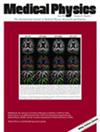A GPU-accelerated Monte Carlo dose engine for external beam radiotherapy
Abstract
Background
Accurate dose computation is crucial in intensity-modulated radiation therapy. Owing to its high accuracy, Monte Carlo method is considered the gold standard for radiation dose computation. Its efficiency, however, demands continuous improvement.
Purpose
This study aims to develop a GPU-accelerated Monte Carlo radiation dose engine (GARDEN) for fast and accurate dose computation in external beam radiotherapy.
Methods
In GARDEN simulation, photon and electron transport were modeled using Woodcock tracking and Class II condensed history technique, respectively. To enhance GPU computational efficiency, warp convergence optimization and coalesced access methods were employed. A novel linear accelerator (Linac) head model was established by incorporating a virtual source and a digital collimator system. The physics was verified against GEANT4 in both homogeneous and heterogeneous phantoms. The Linac head model was commissioned using data measured in a water tank and validated by comparing simulation with film doses for two alternating open and closed MLC patterns. Finally, computational efficiency and accuracy were further evaluated in clinical IMRT and VMAT treatment plans.
Results
GARDEN was more than 2500 times faster than GEANT4, with dose differences less than 1% in both homogeneous water and heterogeneous water-lung-bone phantoms. Compared to commission data, the average differences in percentage depth dose curves were less than 1%, and the penumbra differences in lateral dose profiles were less than 1 mm for various radiation field sizes. For two MLC patterns, the gamma pass rates between GARDEN simulations and films were 98.78% and 97.30% at 2%/2 mm criteria, respectively. Both IMRT and VMAT treatment plans achieved gamma pass rates exceeding 99.23% at 3%/3 mm criteria compared to GEANT4 results, with GARDEN completing the dose calculations within 3 s at ∼1% uncertainty on an i9-13900K CPU and NVIDIA 4080 GPU.
Conclusion
The accuracy and efficiency of GARDEN has been benchmarked against GEANT4 and validated in both phantoms and clinical treatment plans. With its capability for fast and accurate dose computation, GARDEN shows strong potential for applications in treatment planning and quality assurance.

 求助内容:
求助内容: 应助结果提醒方式:
应助结果提醒方式:


